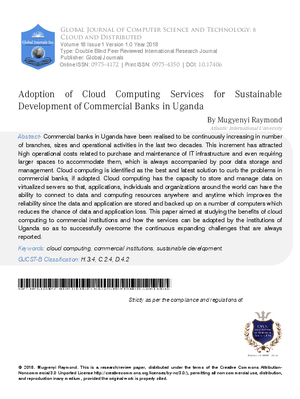Abstract
Commercial banks in Uganda have been realised to be continuously increasing in number of branches sizes and operational activities in the last two decades This increment has attracted high operational costs related to purchase and maintenance of IT infrastructure and even requiring larger spaces to accommodate them which is always accompanied by poor data storage and management Cloud computing is identified as the best and latest solution to curb the problems in commercial banks if adopted Cloud computing has the capacity to store and manage data on virtualized servers so that applications individuals and organizations around the world can have the ability to connect to data and computing resources anywhere and anytime which improves the reliability since the data and application are stored and backed up on a number of computers which reduces the chance of data and application loss This paper aimed at studying the benefits of cloud computing to commercial institutions and how the services can be adopted by the institutions of Uganda so as to successfully overcome the continuous expanding challenges that are always reported A proposed system for cloud computing deployment to serve commercial banks has been developed together with recommendations for cloud computing adoption and effective utilization and management The relevant conclusions for the paper have also been drawn
This work is licensed under a Creative Commons Attribution 4.0 International License.
Copyright (c) 2017 Authors and Global Journals Private Limited

